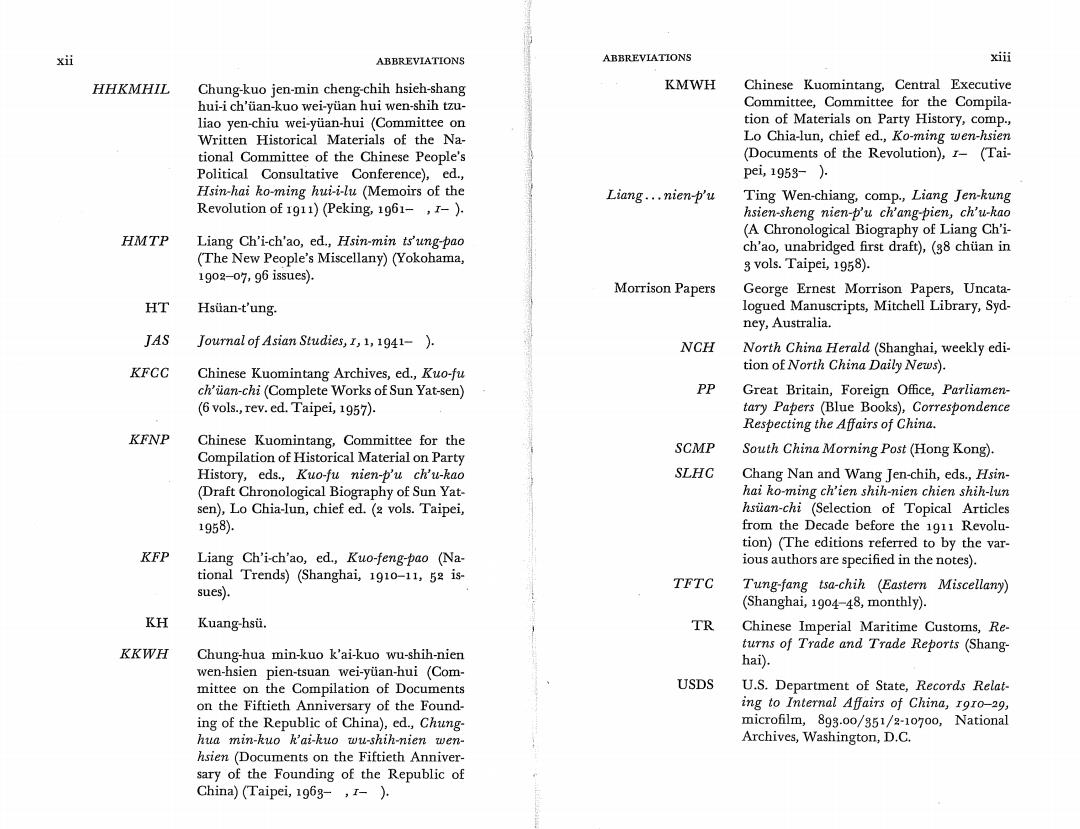
xi近 ABBREVIATIONS ABBREVIATIONS xiii HHKMHIL Chung-kuo jen-min cheng-chih hsieh-shang KMWH Chinese Kuomintang,Central Executive hui-i ch'tian-kuo wei-yiian hui wen-shih tzu- Committee,Committee for the Compila- liao yen-chiu wei-yuian-hui (Committee on tion of Materials on Party History,comp., Written Historical Materials of the Na- Lo Chia-lun,chief ed.,Ko-ming wen-hsien tional Committee of the Chinese People's (Documents of the Revolution),-(Tai- Political Consultative Conference),ed., pei,1953-). Hsin-hai ko-ming hui-i-lu(Memoirs of the Liang.…nicn-p'u Ting Wen-chiang,comp.,Liang Jen-kung Revolution of 1911)(Peking,1961-,-). hsien-sheng nien-p'u ch'ang pien,ch'u-hao (A Chronological Biography of Liang Ch'i- HMTP Liang Ch'i-ch'ao,ed.,Hsin-min ts'ung-pao ch'ao,unabridged first draft),(88 chuian in (The New People's Miscellany)(Yokohama, 3 vols.Taipei,1958). 1902-07,96i8sues). Morrison Papers George Ernest Morrison Papers,Uncata- HT Hsuan-t'ung. logued Manuscripts,Mitchell Library,Syd- ney,Australia. JAS Journal of Asian Studies,1,1,1941-). NCH North China Herald(Shanghai,weekly edi- KFCC Chinese Kuomintang Archives,ed.,Kuo-fu tion of North China Daily News). ch'iian-chi(Complete Works of Sun Yat-sen) PP Great Britain,Foreign Office,Parliamen- (6 vols.,rev.ed.Taipei,1957). tary Papers (Blue Books),Correspondence Respecting the Affairs of China. KFNP Chinese Kuomintang,Committee for the Compilation of Historical Material on Party SCMP South China Morning Post (Hong Kong). History,eds.,Kuo-fu nien-p'u ch'u-kao SLHC Chang Nan and Wang Jen-chih,eds.,HIsin- (Draft Chronological Biography of Sun Yat- hai ko-ming ch'ien shih-nien chien shih-lun sen),Lo Chia-lun,chief ed.(g vols.Taipei, hsiian-chi (Selection of Topical Articles 1958) from the Decade before the 1911 Revolu- tion)(The editions referred to by the var- KFP Liang Ch'i-ch'ao,ed.,Kuo-feng-pao (Na- ious authors are specified in the notes). tional Trends)(Shanghai,1910-11,52 is- TFTC sues). Tung-fang tsa-chih (Eastern Miscellany) (Shanghai,1904-48,monthly). KH Kuang-hsti. TR Chinese Imperial Maritime Customs,Re- KKWH turns of Trade and Trade Reports (Shang- Chung-hua min-kuo k'ai-kuo wu-shih-nien hai). wen-hsien pien-tsuan wei-yuan-hui (Com- mittee on the Compilation of Documents USDS U.S.Department of State,Records Relat- on the Fiftieth Anniversary of the Found- ing to Internal Affairs of China,191o-29, ing of the Republic of China),ed.,Chung- microfilm,893.00/851/2-10700,National hua min-kuo h'ai-kuo wu-shih-nien wen- Archives,Washington,D.C. hsien (Documents on the Fiftieth Anniver- sary of the Founding of the Republic of China)(Taipei,1963-,-)
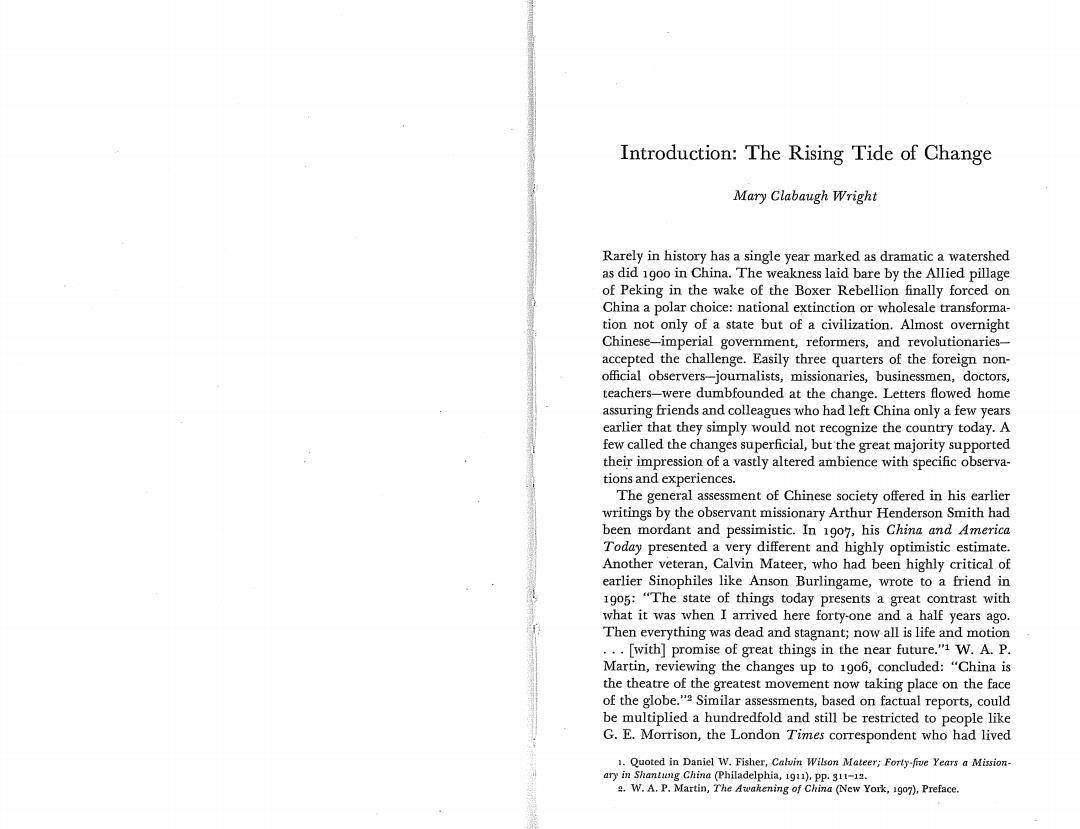
Introduction:The Rising Tide of Change Mary Clabaugh Wright Rarely in history has a single year marked as dramatic a watershed as did 1goo in China.The weakness laid bare by the Allied pillage of Peking in the wake of the Boxer Rebellion finally forced on China a polar choice:national extinction or wholesale transforma- tion not only of a state but of a civilization.Almost overnight Chinese-imperial government,reformers,and revolutionaries- accepted the challenge.Easily three quarters of the foreign non- official observers-journalists,missionaries,businessmen,doctors, teachers-were dumbfounded at the change.Letters flowed home assuring friends and colleagues who had left China only a few years earlier that they simply would not recognize the country today.A few called the changes superficial,but the great majority supported their impression of a vastly altered ambience with specific observa- tions and experiences. The general assessment of Chinese society offered in his earlier writings by the observant missionary Arthur Henderson Smith had been mordant and pessimistic.In 1907,his China and America Today presented a very different and highly optimistic estimate. Another veteran,Calvin Mateer,who had been highly critical of earlier Sinophiles like Anson Burlingame,wrote to a friend in 1905:"The state of things today presents a great contrast with what it was when I arrived here forty-one and a half years ago. Then everything was dead and stagnant;now all is life and motion ..[with]promise of great things in the near future."IW.A.P. Martin,reviewing the changes up to 1906,concluded:"China is the theatre of the greatest movement now taking place on the face of the globe."2 Similar assessments,based on factual reports,could be multiplied a hundredfold and still be restricted to people like G.E.Morrison,the London Times correspondent who had lived 1.Quoted in Daniel W.Fisher,Calvin Wilson Mateer;Forty-five Years a Mission- ary in Shantung China (Philadelphia,1911).pp.311-1. 2.W.A.P.Martin,The Awakening of China (New York,1go7),Preface
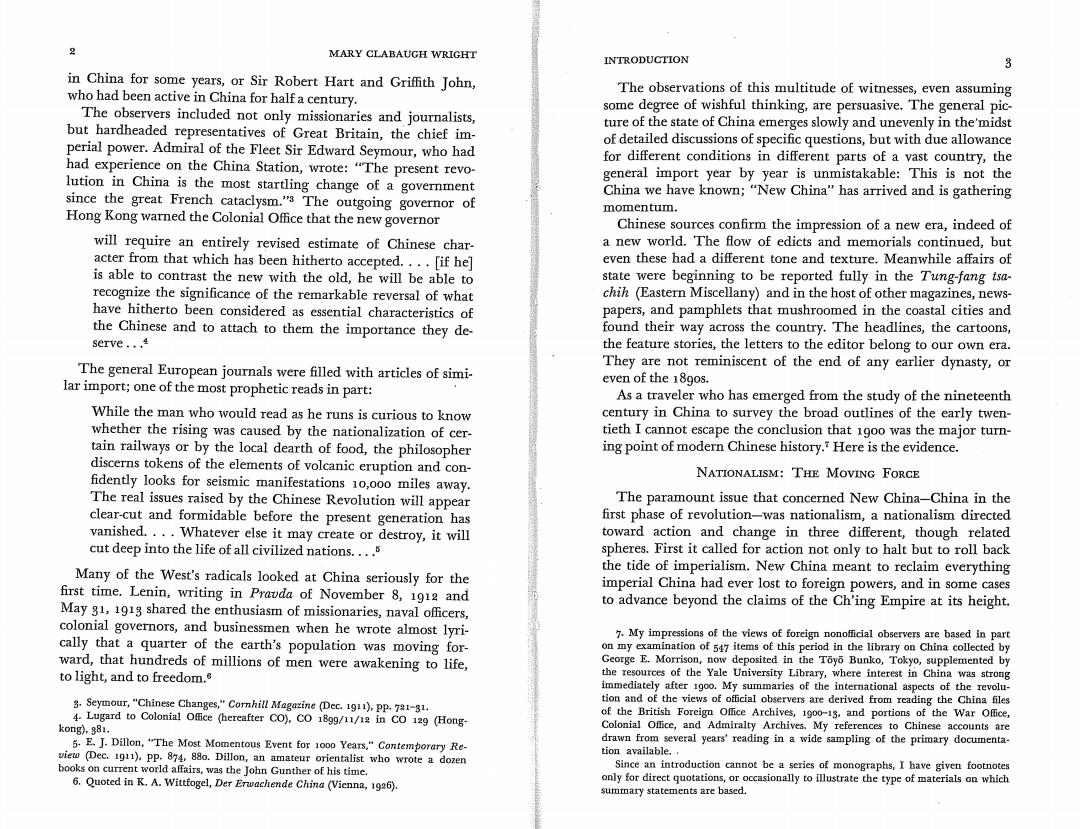
2 MARY CLABAUGH WRIGHT INTRODUCTION 9 in China for some years,or Sir Robert Hart and Griffith John, who had been active in China for half a century. The observations of this multitude of witnesses,even assuming The observers included not only missionaries and journalists, some degree of wishful thinking,are persuasive.The general pic- but hardheaded representatives of Great Britain,the chief im- ture of the state of China emerges slowly and unevenly in the'midst perial power.Admiral of the Fleet Sir Edward Seymour,who had of detailed discussions of specific questions,but with due allowance had experience on the China Station,wrote:"The present revo- for different conditions in different parts of a vast country,the lution in China is the most startling change of a government general import year by year is unmistakable:This is not the since the great French cataclysm."3 The outgoing governor of China we have known;"New China"has arrived and is gathering Hong Kong warned the Colonial Office that the new governor momentum. Chinese sources confirm the impression of a new era,indeed of will require an entirely revised estimate of Chinese char- a new world.The flow of edicts and memorials continued,but acter from that which has been hitherto accepted....[if he] even these had a different tone and texture.Meanwhile affairs of is able to contrast the new with the old,he will be able to state were beginning to be reported fully in the Tung-fang tsa- recognize the significance of the remarkable reversal of what chik (Eastern Miscellany)and in the host of other magazines,news- have hitherto been considered as essential characteristics of papers,and pamphlets that mushroomed in the coastal cities and the Chinese and to attach to them the importance they de- found their way across the country.The headlines,the cartoons, serve..4 the feature stories,the letters to the editor belong to our own era. The general European journals were filled with articles of simi- They are not reminiscent of the end of any earlier dynasty,or lar import;one of the most prophetic reads in part: even of the 18gos. As a traveler who has emerged from the study of the nineteenth While the man who would read as he runs is curious to know century in China to survey the broad outlines of the early twen- whether the rising was caused by the nationalization of cer- tieth I cannot escape the conclusion that 1goo was the major turn- tain railways or by the local dearth of food,the philosopher ing point of modern Chinese history.7 Here is the evidence. discerns tokens of the elements of volcanic eruption and con- fidently looks for seismic manifestations 10,000 miles away. NATIONALISM:THE MOVING FORCE The real issues raised by the Chinese Revolution will appear The paramount issue that concerned New China-China in the clear-cut and formidable before the present generation has first phase of revolution-was nationalism,a nationalism directed vanished....Whatever else it may create or destroy,it will toward action and change in three different,though related cut deep into the life of all civilized nations....5 spheres.First it called for action not only to halt but to roll back Many of the West's radicals looked at China seriously for the the tide of imperialism.New China meant to reclaim everything first time.Lenin,writing in Pravda of November 8,1912 and imperial China had ever lost to foreign powers,and in some cases May 1,1913 shared the enthusiasm of missionaries,naval officers, to advance beyond the claims of the Ch'ing Empire at its height. colonial governors,and businessmen when he wrote almost lyri- 7.My impressions of the views of foreign nonofficial observers are based in part cally that a quarter of the earth's population was moving for- on my examination of 547 items of this period in the library on China collected by ward,that hundreds of millions of men were awakening to life, George E.Morrison,now deposited in the Toyo Bunko,Tokyo,supplemented by to light,and to freedom. the resources of the Yale University Library,where interest in China was strong immediately after igoo.My summaries of the international aspects of the revolu- 3.Seymour,"Chinese Changes,"Cornhill Magazine (Dec.1911),pp.1-81. tion and of the views of official observers are derived from reading the China files 4.Lugard to Colonial Ofice (hereafter CO).CO 1899/11/13 in CO 129 (Hong- of the British Foreign Office Archives,1900-13.and portions of the War Office, kong),881. Colonial Office,and Admiralty Archives.My references to Chinese accounts are 5.E.J.Dillon,"The Most Momentous Event for 1o00 Years,"Contemporary Re- drawn from several years'reading in a wide sampling of the primary documenta- view (Dec.1911).pp.874,880.Dillon,an amateur orientalist who wrote a dozen tion available.. books on current world affairs,was the John Gunther of his time. Since an introduction cannot be a series of monographs,I have given footnotes 6.Quoted in K.A.Wittfogel,Der Erwachende China(Vienna,1926). only for direct quotations,or occasionally to illustrate the type of materials on which summary statements are based
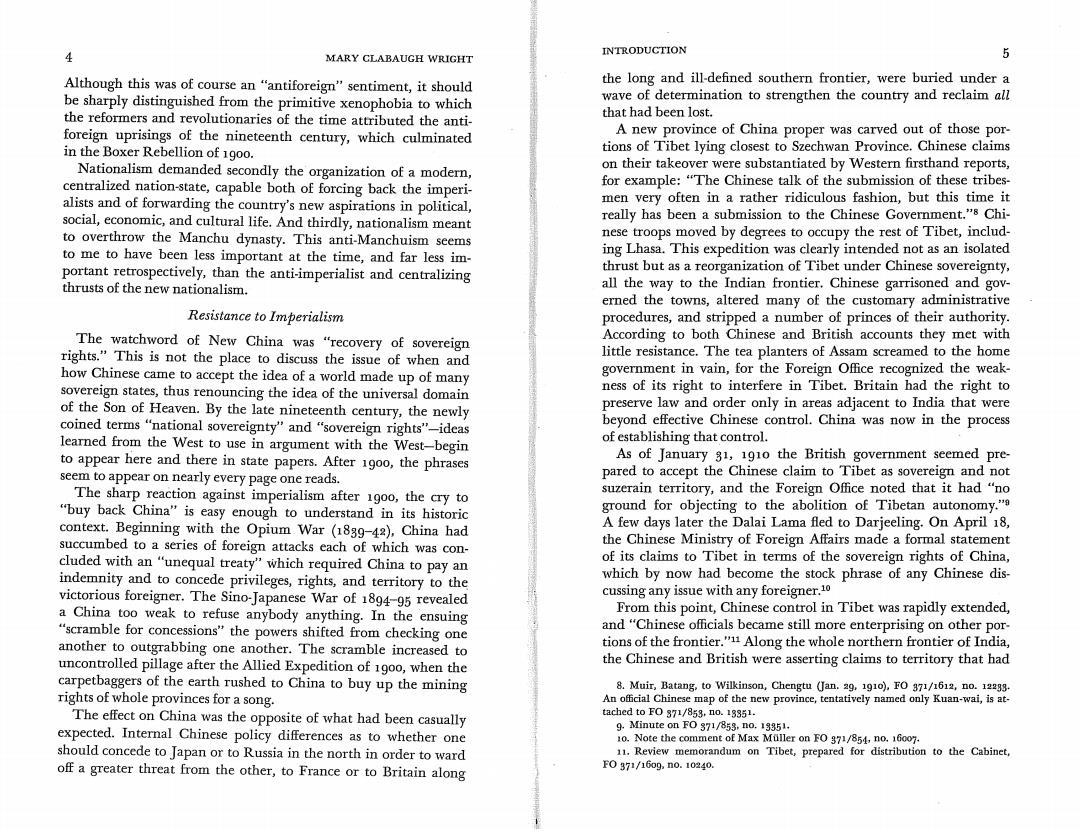
4 INTRODUCTION MARY CLABAUGH WRIGHT 5 Although this was of course an"antiforeign"sentiment,it should the long and ill-defined southern frontier,were buried under a be sharply distinguished from the primitive xenophobia to which wave of determination to strengthen the country and reclaim all the reformers and revolutionaries of the time attributed the anti- that had been lost. foreign uprisings of the nineteenth century,which culminated A new province of China proper was carved out of those por- in the Boxer Rebellion of 1900. tions of Tibet lying closest to Szechwan Province.Chinese claims Nationalism demanded secondly the organization of a modern, on their takeover were substantiated by Western firsthand reports, centralized nation-state,capable both of forcing back the imperi- for example:"The Chinese talk of the submission of these tribes- alists and of forwarding the country's new aspirations in political, men very often in a rather ridiculous fashion,but this time it social,economic,and cultural life.And thirdly,nationalism meant really has been a submission to the Chinese Government."8 Chi- to overthrow the Manchu dynasty.This anti-Manchuism seems nese troops moved by degrees to occupy the rest of Tibet,includ- to me to have been less important at the time,and far less im- ing Lhasa.This expedition was clearly intended not as an isolated portant retrospectively,than the anti-imperialist and centralizing thrust but as a reorganization of Tibet under Chinese sovereignty, thrusts of the new nationalism. all the way to the Indian frontier.Chinese garrisoned and gov- erned the towns,altered many of the customary administrative Resistance to Imperialism procedures,and stripped a number of princes of their authority. The watchword of New China was "recovery of sovereign According to both Chinese and British accounts they met with rights."This is not the place to discuss the issue of when and little resistance.The tea planters of Assam screamed to the home how Chinese came to accept the idea of a world made up of many government in vain,for the Foreign Office recognized the weak- sovereign states,thus renouncing the idea of the universal domain ness of its right to interfere in Tibet.Britain had the right to of the Son of Heaven.By the late nineteenth century,the newly preserve law and order only in areas adjacent to India that were coined terms "national sovereignty"and "sovereign rights"-ideas beyond effective Chinese control.China was now in the process learned from the West to use in argument with the West-begin of establishing that control. to appear here and there in state papers.After 1900,the phrases As of January 81,1910 the British government seemed pre- seem to appear on nearly every page one reads. pared to accept the Chinese claim to Tibet as sovereign and not The sharp reaction against imperialism after 1g00,the cry to suzerain territory,and the Foreign Office noted that it had "no "buy back China"is easy enough to understand in its historic ground for objecting to the abolition of Tibetan autonomy." context.Beginning with the Opium War (1839-42),China had A few days later the Dalai Lama fled to Darjeeling.On April 18, succumbed to a series of foreign attacks each of which was con- the Chinese Ministry of Foreign Affairs made a formal statement cluded with an"unequal treaty"which required China to pay an of its claims to Tibet in terms of the sovereign rights of China, indemnity and to concede privileges,rights,and territory to the which by now had become the stock phrase of any Chinese dis- victorious foreigner.The Sino-Japanese War of 1894-95 revealed cussing any issue with any foreigner.10 a China too weak to refuse anybody anything.In the ensuing From this point,Chinese control in Tibet was rapidly extended, "scramble for concessions"the powers shifted from checking one and "Chinese officials became still more enterprising on other por- another to outgrabbing one another.The scramble increased to tions of the frontier."Along the whole northern frontier of India, uncontrolled pillage after the Allied Expedition of 1go0,when the the Chinese and British were asserting claims to territory that had carpetbaggers of the earth rushed to China to buy up the mining 8.Muir,Batang,to Wilkinson,Chengtu (Jan.29,1910),FO 371/1612,no.12288. rights of whole provinces for a song. An official Chinese map of the new province,tentatively named only Kuan-wai,is at. The effect on China was the opposite of what had been casually tached to FO 871/853.no.13851. expected.Internal Chinese policy differences as to whether one 9.Minute on F0371853,no.13351. 10.Note the comment of Max Muller on FO 371/854.no.16007. should concede to Japan or to Russia in the north in order to ward 11.Review memorandum on Tibet,prepared for distribution to the Cabinet, off a greater threat from the other,to France or to Britain along F0371/16og,n0.10240
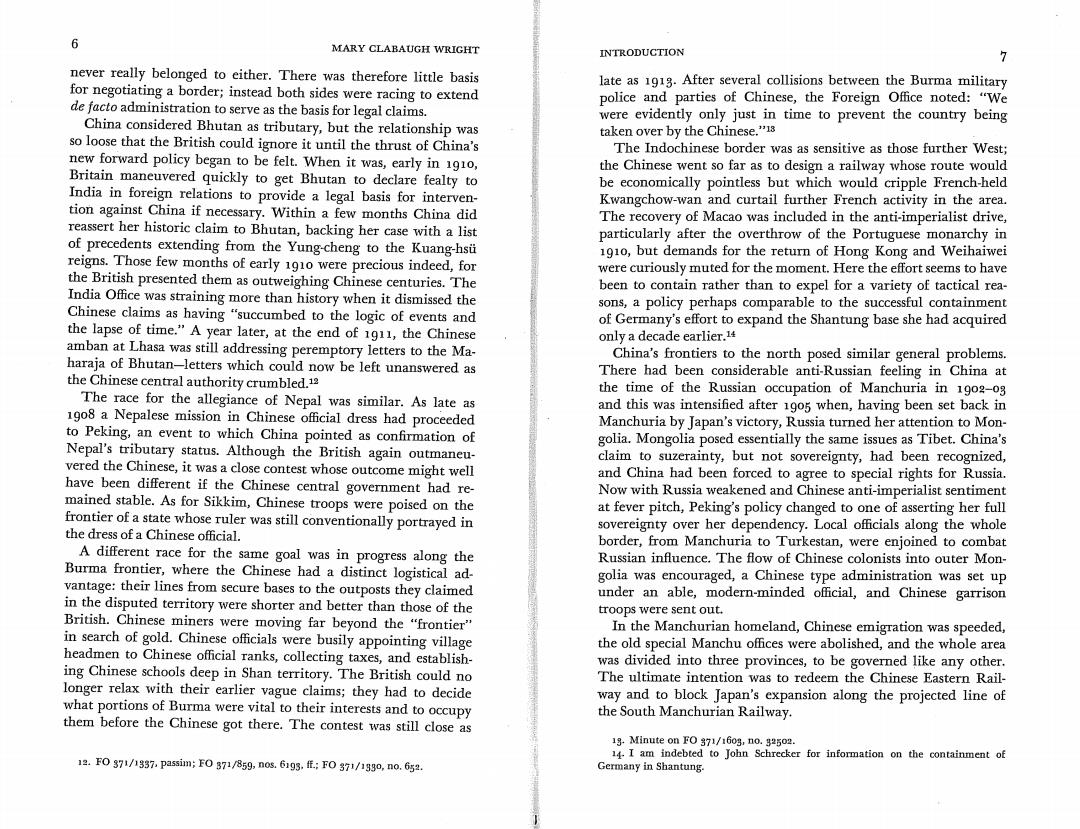
6 MARY CLABAUGH WRIGHT INTRODUCTION 7 never really belonged to either.There was therefore little basis for negotiating a border;instead both sides were racing to extend late as 1918.After several collisions between the Burma military de facto administration to serve as the basis for legal claims. police and parties of Chinese,the Foreign Office noted:"We were evidently only just in time to prevent the country being China considered Bhutan as tributary,but the relationship was taken over by the Chinese."18 so loose that the British could ignore it until the thrust of China's The Indochinese border was as sensitive as those further West; new forward policy began to be felt.When it was,early in 1910, the Chinese went so far as to design a railway whose route would Britain maneuvered quickly to get Bhutan to declare fealty to be economically pointless but which would cripple French-held India in foreign relations to provide a legal basis for interven- Kwangchow-wan and curtail further French activity in the area. tion against China if necessary.Within a few months China did The recovery of Macao was included in the anti-imperialist drive, reassert her historic claim to Bhutan,backing her case with a list particularly after the overthrow of the Portuguese monarchy in of precedents extending from the Yung-cheng to the Kuang-hsii 1910,but demands for the return of Hong Kong and Weihaiwei reigns.Those few months of early 1g10 were precious indeed,for were curiously muted for the moment.Here the effort seems to have the British presented them as outweighing Chinese centuries.The been to contain rather than to expel for a variety of tactical rea- India Office was straining more than history when it dismissed the sons,a policy perhaps comparable to the successful containment Chinese claims as having"succumbed to the logic of events and of Germany's effort to expand the Shantung base she had acquired the lapse of time."A year later,at the end of 1911,the Chinese only a decade earlier.14 amban at Lhasa was still addressing peremptory letters to the Ma- China's frontiers to the north posed similar general problems. haraja of Bhutan-letters which could now be left unanswered as There had been considerable anti-Russian feeling in China at the Chinese central authority crumbled.13 the time of the Russian occupation of Manchuria in 1go3-03 The race for the allegiance of Nepal was similar.As late as 1908 a Nepalese mission in Chinese official dress had proceeded and this was intensified after 1g05 when,having been set back in to Peking,an event to which China pointed as confirmation of Manchuria by Japan's victory,Russia turned her attention to Mon- Nepal's tributary status.Although the British again outmaneu- golia.Mongolia posed essentially the same issues as Tibet.China's claim to suzerainty,but not sovereignty,had been recognized, vered the Chinese,it was a close contest whose outcome might well have been different if the Chinese central government had re- and China had been forced to agree to special rights for Russia. mained stable.As for Sikkim,Chinese troops were poised on the Now with Russia weakened and Chinese anti-imperialist sentiment at fever pitch,Peking's policy changed to one of asserting her full frontier of a state whose ruler was still conventionally portrayed in sovereignty over her dependency.Local officials along the whole the dress of a Chinese official. border,from Manchuria to Turkestan,were enjoined to combat A different race for the same goal was in progress along the Russian influence.The flow of Chinese colonists into outer Mon- Burma frontier,where the Chinese had a distinct logistical ad- golia was encouraged,a Chinese type administration was set up vantage:their lines from secure bases to the outposts they claimed under an able,modern-minded official,and Chinese garrison in the disputed territory were shorter and better than those of the troops were sent out. British.Chinese miners were moving far beyond the "frontier" In the Manchurian homeland,Chinese emigration was speeded, in search of gold.Chinese officials were busily appointing village the old special Manchu offices were abolished,and the whole area headmen to Chinese official ranks,collecting taxes,and establish- was divided into three provinces,to be governed like any other. ing Chinese schools deep in Shan territory.The British could no The ultimate intention was to redeem the Chinese Eastern Rail- longer relax with their earlier vague claims;they had to decide what portions of Burma were vital to their interests and to occupy way and to block Japan's expansion along the projected line of the South Manchurian Railway. them before the Chinese got there.The contest was still close as 13.Minute0nF0371/i603,no.35o2. 14.I am indebted to John Schrecker for information on the containment of 12.F0371/1337,pa5sim:F0371/859,n0s.6193.ff:F0371/1g9o,n0.632. Germany in Shantung